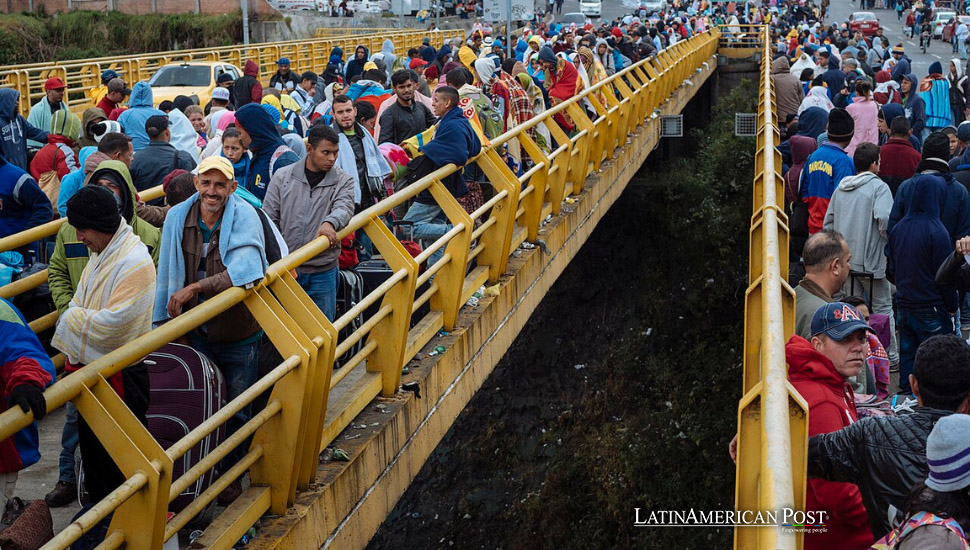Migration Tides Turning as Venezuelans Flow to Colombia Shows First Decline in a Decade

For the first time in a decade, the Venezuelan migration wave into Colombia, the largest recipient of Venezuelan exiles, has shown signs of ebbing, reflecting a complex interplay of regional dynamics and policy shifts.
Changing Trends: Venezuelan Migration to Colombia
In the ever-evolving tapestry of Latin American migrations, the movement of Venezuelans into Colombia stands out as a particularly poignant chapter. This migration, driven by a cocktail of economic hardship, political instability, and social turmoil in Venezuela, has seen Colombia become the primary haven for those fleeing their homeland. However, recent developments indicate a significant shift in this trend, with the number of Venezuelan migrants in Colombia decreasing for the first time in ten years.
Migración Colombia, the nation’s immigration authority, has documented this unprecedented event. In December 2023, the Venezuelan migrant population in Colombia was recorded at 2,864,796, marking a 1.10% decrease from the 2,896,748 registered in December 2022. This reduction, albeit modest, marks a pivotal moment in the migration narrative between Venezuela and Colombia, signaling a potential shift in the migratory patterns that have shaped the region for over a decade.
The decline in Venezuelan migrants in Colombia can be attributed to several factors, including the gradual improvement of diplomatic and economic relations between Colombia and Venezuela. The resumption of bilateral ties has opened new avenues for cooperation and assistance, potentially alleviating some of the pressures that have driven Venezuelans to seek refuge abroad.
Diplomacy and Regularization Efforts
Moreover, Colombia’s efforts to regularize Venezuelan migrants have played a crucial role in this development. The mass regularization process initiated in 2021 has provided nearly 2.3 million Venezuelan migrants access to essential services such as healthcare, education, and labor rights, thanks to the Protection Status Statute. This initiative not only aids in integrating Venezuelans into Colombian society but also contributes to a more stable and controlled migration flow.
Despite these positive strides, challenges remain. An estimated 227,389 Venezuelan migrants in Colombia are still in an irregular situation, having failed to transition from the Special Stay Permit (PEP) to the Special Protection Status in time. This underscores the ongoing complexities of migration management and the need for continued efforts to ensure the well-being and legal security of migrants.
The Venezuelan migration phenomenon is not confined to Colombia; it reverberates across Latin America, affecting countries such as Peru, Ecuador, Chile, and Brazil. These nations, too, have grappled with the influx of Venezuelans, each implementing various strategies to manage the humanitarian and logistical challenges posed by such large-scale migrations. The regional impact highlights the importance of collaborative, comprehensive approaches to address the root causes and consequences of migration in Latin America.
As Colombia and its neighbors navigate the intricacies of Venezuelan migration, the international community’s role becomes increasingly crucial. Support from global institutions and countries outside the region can bolster local efforts to provide humanitarian aid, foster economic development, and facilitate the integration of migrants into host societies.
Navigating a New Phase in Regional Dynamics
The recent downturn in Venezuelan migration to Colombia may signal the beginning of a new phase in the complex relationship between migration, diplomacy, and regional solidarity in Latin America. While the decrease is a notable development, it also serves as a reminder of migration’s enduring challenges to both origin and host countries. Addressing these challenges requires a balanced mix of policy innovation, international cooperation, and a deep commitment to the rights and dignity of migrants.
Also read: Venezuela’s Eastern Caribbean Exercises Escalate Border Dispute
The evolving dynamics of Venezuelan migration to Colombia and beyond underscore the need for sustained attention and action. As Latin America continues to contend with the ramifications of this migration wave, the lessons learned and the strategies employed will undoubtedly contribute to a richer understanding of migration’s role in shaping the region’s future. Through collaborative efforts and shared responsibility, a path toward stability, integration, and mutual respect can be forged for Venezuelans and their host communities.





